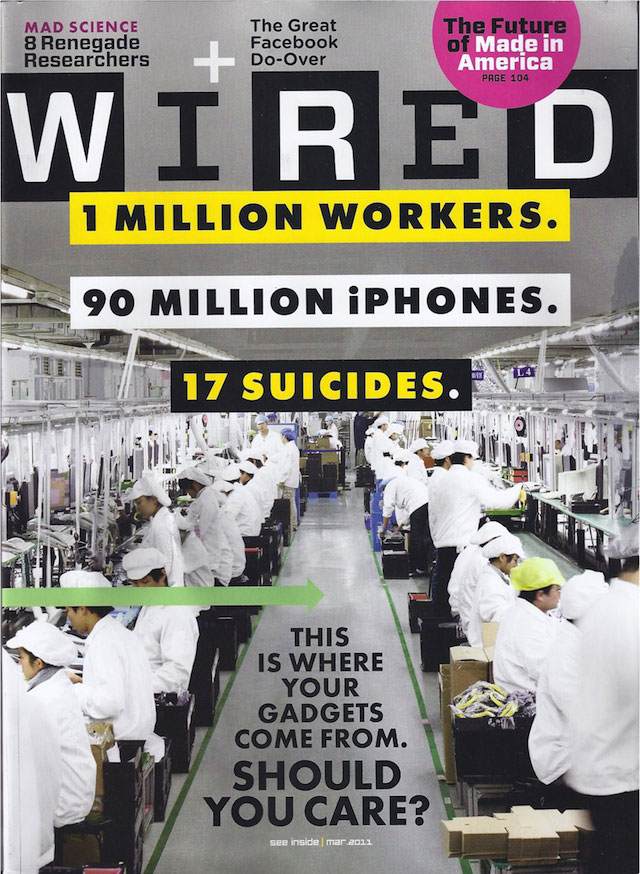There can be little debate at this point that tech journalists dropped the ball on Foxconn. The NYTimes walked in and ran an incredible story in January after years and years of clear signs that there were incredible stories that needed telling throughout China’s SEZs, stories about our tools and how they are made, and tech journalists were at best gormlessly ignorant, and at worst, calculatedly self-interested in not rocking the boat.
The few pieces of tech journalism that even touched on Chinese labor issues before the NYT expose were laughable. The largest by far was WIRED, running a full cover story specifically on labor issues at Foxconn.

I remember when hearing that this was happening that I was elated—finally, someone in tech journalism was going to stand up, in arguably one of tech journalism’s premiere outlets, and give an accounting.
I was naive.
WIRED ran a cover story in which a journalist visited Foxconn, a company with an appalling record on labor, and never interviewed a single actual worker.
Think on that for a moment—they went all the way there, expressly to tell a story about labor, and no workers are in the story who perform that labor.
Not a quote. Not a voice. Nothing.

Amazingly, other tech journalists swallowed that hook, line and sinker—when the story appeared in early 2011, it raised no flags with anyone in tech journalism. It told a story they wanted to hear—there may be problems, but hey, what are you going to do? It gave them the excuse that they never needed to care, a narrative that has been carefully massaged and defended, because it makes for good business.
In light of everything that has followed, from the NYTimes pieces on Foxconn’s manufacturing chain, to the FLA audits from just a few months ago, it should be clear just how wrong this article was. It’s a great example of printing something that is eminently factcheckable, but absolutely fails to tell the truth.
Today we are at a crossroads. Tech journalists can no longer pretend that they don’t know about the state of Chinese manufacturing—the last eight months have destroyed that illusion, which was *always* an illusion—I read the NGO reports, which existed years before, and so could all the other tech journalists.
This story has always been in their court. Always.
Today Apple has paid for audits that showed horrible conditions in its supply lines, which it then pledged to reform. As of late May, SACOM’s reports indicate that nothing has substantially changed for workers on the ground in that supply chain.
That is a story.
Last week China Labor Watch released an extensive report about child labor in Samsung’s supply chain. It included interviews with child workers, accounts of incredibly excessive hours and terrible conditions.
That is a story.
The hard work of these NGOs on the ground have given tech journalists a chance to prove that they can do the right thing.
Look—I know a little something about this.
It’s hard to admit when you’ve fallen short. It’s hard to face that you need to apologize, and then stand up, dust yourself off, and get to work telling the stories that need telling.
It’s not easy. It would be easier to not do it, I know that. But you are journalists, and if I’ve had one thing pounded into me, again and again over these months it's how sacred and special and important your profession is.
Prove it. Admit to yourselves that you missed that story, understand why you missed it, see that it’s an even bigger story now, and start digging.
I dug. You can laugh and jeer at me, but I paid my way and went to China and I tried. I reached out to tech journalists and foreign correspondents and they all ignored me. And so I made my own path.
You have more resources than I have ever had. Show us all how it is done.
Please go do your jobs.
It’s possible I didn’t need to write this—perhaps there are tech journalists that are on the case, right now, investigating Samsung. Maybe tech journalists are looking askance at Apple’s reforms, and pulling together plans to deeply assess them. Hopefully others are doing longer pieces about the whole landscape of Chinese tech manufacturing.
I hope that is true. I really do.
But I’m publishing this today so that you know you are on the clock. Investigations take time and resources—you think I don’t know that, but I do. You’ll need to organize, seek out sources, do the careful, painstaking, often-boring work of real journalism.
But between the Apple story and its aftermath, and the Samsung story, there’s no excuses left. If tech journalism, as a field, refuses to cover this story—the world is going to know it. And each and every one of you is going to know it, too.
I want to be wrong about this.
I sincerely wish you good luck.
